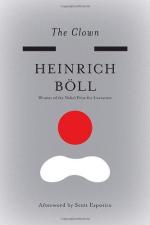|
This section contains 330 words (approx. 2 pages at 300 words per page) |

|
Throughout his career, Boll acknowledged the influence of numerous literary figures including German as well as non-German authors indicative of his familiarity with and appreciation of world literature. Descending from the German narrative tradition associated primarily with Heinrich Heine and Thomas Mann, Boll has also been compared in his concern for social justice with Bertolt Brecht; however, his contemporary rival in German letters was unmistakably Gunter Grass whose body of work mirrors Boll's in exploring the terrain of the postwar era in Germany. Grass, particularly in the epic novel The Tin Drum (1959), demonstrated as Boll attempted in the majority of his fiction to define the present by its inextricable relationship to the past, while simultaneously enlisting literature in the cause of social change.
Highly appreciative of Western authors, Boll professed his indebtedness to both William Faulkner and Thomas Wolfe, and stylistically, his terse, eminently readable language...
|
This section contains 330 words (approx. 2 pages at 300 words per page) |

|




